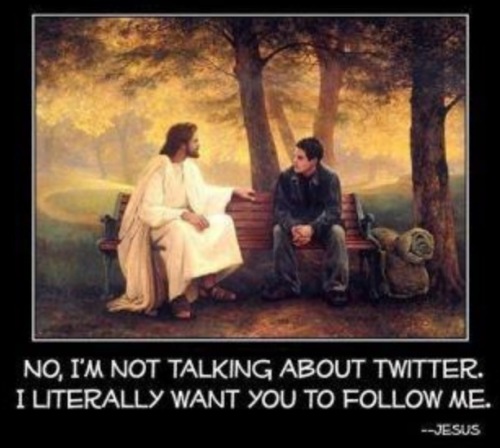 "What's the bottom line?" This was the classic question of the 80's. Similar clichés abound today—the most bang for your buck, trading time for dollars, etc.
"What's the bottom line?" This was the classic question of the 80's. Similar clichés abound today—the most bang for your buck, trading time for dollars, etc.
On one hand, I expect this in the business world, even though many leaders tell us it shouldn't be that way (Ex– Good to Great).
During our small group men's study last week, I saw how much this attitude permeates the Christian realm. I don't see this as a good trend for the Christian faith. But how can we change it?
How many followers do you have?
As an author and blogger, I hear a lot about building my platform, increasing my email list, and getting more subscriptions. All important things in this day and age. Why? So the message will get out to more people, and to sell more product (books, courses, etc.).
I understand the reasoning and incentive, I'm just not so sure it's what is most important.
If the goal is success, a better lifestyle, fame or money, then I guess those things are really important. But those things aren't so important to me now.
Don't get me wrong, I'm not against such things or see them as wrong. I just think there's more important things than focusing on results.
What's most important?
What could be more important than results? Relationships!
In our discussion last Friday, we talked about sharing our faith and helping others grow in their faith. We talked about online devotionals and studies, book and pamphlets, and different local ministries.
It's subtle, but we realized this is part of the getting results mind-set. Do you see it?
[bctt tweet="Are results more important than relationships?"]
All these are great ideas, but they all move in a common direction. Each are a suggestion that replaces spending time with whomever we want to share our faith.
Where did we get so off track in our commitment to share our faith or encourage others in faith matters? Does it matter...really?
What matters is getting back to what is centrally important—building relationships.
[bctt tweet="What matters is building relationships"]
WDJD?
Remember the WWJD fad? Let's be honest, it became another marketing trend than a means of sharing faith. I posted an article that addressed this by looking at what Jesus did—WDJD.
Reading through all four Gospels, it's not too hard to see what Jesus' priority was. It was people.
When people brought children for Him to bless, or asked Him to heal a child or deliver someone from demonic power, He didn't suggest some alternative to taking time to personally deal with the request. In fact, He insisted on personally taking care of the need.
Was Jesus result oriented?
Was Jesus result oriented? I suppose you could make a case for that, but it seems He was more concerned about the people themselves, not just caring for their need.
How did Jesus disciple those closest to Him? He spent time with them. He used real life situations to teach them. And the closer He got to His main mission (the cross), He intensified the time spent with His apostles.
[bctt tweet=" When Jesus discipled those closest to Him, He spent time with them."]
Whether we consider the approach of Jesus and His apostles to evangelism, discipleship, leadership, or extending God's kingdom (i.e. church growth), it most often started with one or a few persons. The goal wasn't numbers, but relationship. Bringing people into relationship with God, and guiding them in their relationship with God.
Can we do better? I don't see how.
[bctt tweet="Consider the approach of Jesus—it most often started with one or a few persons"]
Results or relationship?
Do we need to choose between results or relationship? I don't think there's a need to choose one in exclusion of the other. Based on what we see in the Gospels and Acts, it seems that results naturally follow building relationships.
I would rather have ten to twenty personal friends than hundreds of Facebook friends. I'd rather see more followers of Jesus than followers on Twitter.
What about you? What's more important to you—results or relationships?
It's a matter of time and priorities. Wherever we make the greatest investment of those two, reveals what we value most.
[bctt tweet="Whatever we invest in the most reveals what we value most."]



